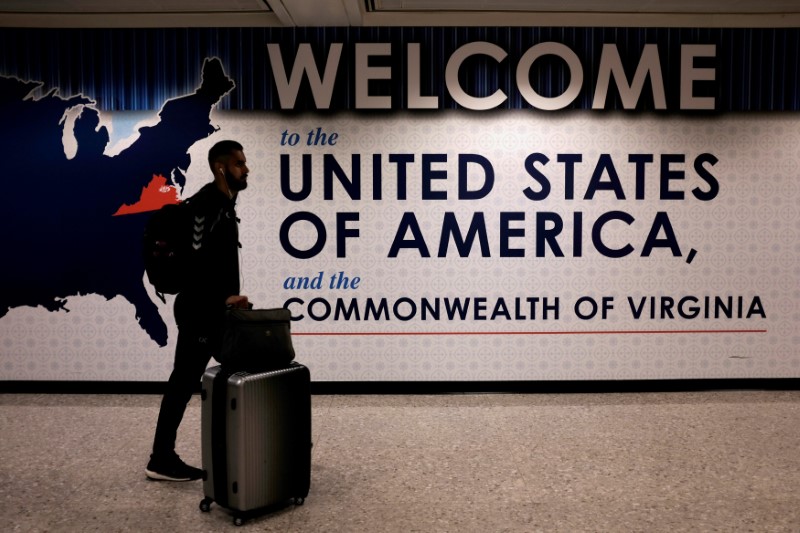By Arshad Mohammed and Yeganeh Torbati
WASHINGTON (Reuters) - Visa applicants from six Muslim-majority countries must have a close U.S. family relationship or formal ties to a U.S. entity to be admitted to the United States under guidance distributed by the U.S. State Department.
The directive defined close family as a parent, spouse, child, adult son or daughter, son-in-law, daughter-in-law or sibling, including step-siblings and other step-family relations, according to a cable distributed to all U.S. diplomatic posts on Wednesday and seen by Reuters.
Close family "does not include grandparents, grandchildren, aunts, uncles, nieces, nephews, cousins, brothers-in-law and sisters-in-law, fiancés, and any other 'extended' family members," according to the cable, first reported by the Associated Press.
Immigration experts noted that fiancés, grandparents and grandchildren did not qualify as a close family relationship.
It also specified that the relationship with a U.S. entity "must be formal, documented, and formed in the ordinary course, rather than for the purpose of evading the E.O.," referring to the executive order signed by U.S. President Donald Trump on March 6 that barred most U.S. travel by citizens of the six nations for 90 days.
The cable advises U.S. consular officers on how to interpret Monday's Supreme Court ruling that allowed parts of the executive order, which had been blocked by the lower courts, to be implemented while the highest U.S. court considers the matter.
The six nations included in the executive order are Iran, Libya, Somalia, Sudan, Syria, and Yemen.
The travel ban will go into effect at 8 p.m. EDT on Thursday, the cable said. (Read the cable at: http://live.reuters.com/Event/Live_US_Politics/989297085)
Asked about the guidance issued on Wednesday night, the State Department declined to comment on internal communications.
The cable's language closely mirrored the Supreme Court's order on the travel ban, but appeared to be a narrow interpretation in some areas, notably in defining close family.
It was unclear on Wednesday evening whether the State Department's interpretation of the court's order would spark further legal action by opponents of the ban.
Several immigration lawyers expressed surprise on Wednesday evening that fiancés, grandparents and grandchildren were not covered.
"This language is extremely disappointing," said Johnathan Smith, legal director at Muslim Advocates, a civil rights group. "Defining close family to exclude grandparents, cousins, and other relatives defies common sense and directly goes against the intent of the Supreme Court's order."
The directive gave several examples of what might constitute a bona fide relationship with a U.S. entity, and said broad categories would be exempt from the travel ban, such as people eligible for student visas, "as their bona fide relationship to a person or entity is inherent in the visa classification."
Similarly, those eligible for family or employment-based immigrant visa applications are exempt from the travel ban, the cable said.
"A worker who accepted an offer of employment from a company in the United States or a lecturer invited to address an audience in the United States would be exempt" from the ban, the order said, but someone who simply made a hotel reservation would not be considered as having a bona fide relationship.
Trump's executive order also imposed a 120-day ban on entry to the United States by refugees. The Supreme Court order, however, said the ban did not cover those refugees "who can credibly claim a bona fide relationship with a person or entity" in the United States.
The State Department guidance was unclear on what U.S. refugee agencies regard as a key question: whether their own dealings with refugees applying to come to the United States constituted a bona fide relationship.
Consulates should continue to interview applicants for so-called diversity visas, which are granted to individuals from countries that typically do not send many people to the United States, according to the cable. In 2015, around 10,500 citizens from the six banned countries were selected for the diversity visa lottery, according to State Department figures.

The travel ban will likely bar such visas for citizens of the six countries, the cable acknowledged, stating that "we anticipate that very few DV applicants are likely to be exempt from the E.O.’s suspension of entry or to qualify for a waiver."